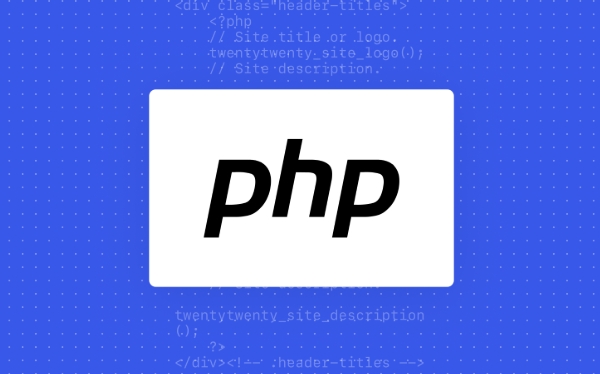The Scope Resolution Order: How PHP Finds Your Variables
Jul 25, 2025 pm 12:14 PMPHP resolves variables in a specific order: 1. Local scope within the current function, 2. Function parameters, 3. Variables imported via use in closures, 4. Global scope only if explicitly declared with global or accessed through $GLOBALS, 5. Superglobals like $_SESSION and $_POST which are always available, and 6. Object properties via $this in class methods, with inheritance from parent classes; visibility rules apply. Unlike languages with dynamic scope, PHP does not automatically search outer scopes, so access must be explicit, reducing bugs and improving predictability when writing functions, closures, and classes.

When you're working with PHP, understanding how variables are accessed—especially in different scopes—is key to writing predictable, bug-free code. PHP follows a clear scope resolution order when looking for variables, and knowing this order helps explain why a variable might be available in one place but not another.

Here’s how PHP resolves variable names when you reference them in your code.
1. Local Scope: First, Check the Current Function
When you're inside a function, PHP first looks for the variable in the local scope.

function test() {
$name = "Alice";
echo $name; // Outputs: Alice
}In this case, $name is found immediately in the local scope. PHP doesn’t need to look further.
But if the variable isn’t declared locally, PHP doesn’t just give up—it keeps searching.

2. Global Scope: Then, Check the Global Namespace (Only If Requested)
If PHP doesn’t find the variable locally and you haven’t imported it, it won’t automatically look in the global scope. You have to explicitly bring global variables into the local scope using the global keyword.
$name = "Bob";
function sayHello() {
global $name;
echo $name; // Outputs: Bob
}Without global $name;, the variable would be undefined inside the function. So the global scope is not searched by default—it only comes into play when you use global or $GLOBALS.
? Note:
$GLOBALS['name']gives direct access to the global scope without needingglobal.
3. Superglobals: Always Available (But Not Through Scope Inheritance)
Superglobals like $_GET, $_POST, $_SESSION, and $_SERVER are always accessible from any scope—you don’t need global to use them.
function getUser() {
return $_SESSION['user']; // Works fine—no global needed
}These are special built-in arrays that PHP automatically makes available everywhere. They’re not subject to the usual scope rules because they’re registered globally by the engine.
?? Important: While superglobals are always accessible, you still need to initialize or populate them (e.g., start a session for
$_SESSION).
4. Closure Use Clauses: Inherited Variables from the Parent Scope
When using anonymous functions (closures), variables from the outer scope aren’t automatically inherited. You must pass them explicitly using the use keyword.
$greeting = "Hello";
$sayHi = function() use ($greeting) {
echo $greeting; // Outputs: Hello
};Without use ($greeting), the closure wouldn’t have access to that variable—even though it’s in the surrounding code.
You can also import by reference with use (&$var) if you need to modify the original.
5. Class Context: $this and Property Resolution
Inside methods, PHP resolves $this automatically (if the method is non-static), and property access follows its own rules:
- First, look for a property in the current object (
$this->prop) - If not found, check parent classes (via inheritance)
- Visibility (
public,protected,private) controls access
class Greeter {
private $name = "Charlie";
public function hello() {
echo $this->name; // Resolves to private property
}
}Here, $this->name is resolved within the object’s property table, not the local variable scope.
Summary of PHP’s Variable Lookup Order
In simple terms, here’s the effective order PHP uses when you write $var:
- Local variables in the current function
- Parameters passed to the function
-
usevariables in closures (explicitly imported) -
Global variables — only if declared with
globalor accessed via$GLOBALS - Superglobals — always available, no declaration needed
-
Object properties — when using
$this->prop, resolved via class structure
? Key Insight: PHP does not automatically search up the call stack or outer scopes like some other languages (e.g., JavaScript closures). Scope access must be explicit.
Common Pitfalls & Tips
? Assuming globals are available in functions
→ Useglobal $varor$GLOBALS.? Expecting closures to capture outer variables automatically
→ Always useuse ($var).? Use superglobals freely inside functions
→ Noglobalneeded for$_POST,$_SESSION, etc.? Prefer dependency injection over global reliance
→ Pass values as parameters instead of usingglobal—makes code more testable.
Understanding PHP’s scope resolution order isn’t about memorizing rules—it’s about writing code that behaves predictably. Once you accept that PHP doesn’t guess what variables you want, and instead requires you to be explicit, your debugging time drops significantly.
Basically: if it’s not local, passed, or explicitly imported, PHP won’t see it.
The above is the detailed content of The Scope Resolution Order: How PHP Finds Your Variables. For more information, please follow other related articles on the PHP Chinese website!

Hot AI Tools

Undress AI Tool
Undress images for free

Undresser.AI Undress
AI-powered app for creating realistic nude photos

AI Clothes Remover
Online AI tool for removing clothes from photos.

Clothoff.io
AI clothes remover

Video Face Swap
Swap faces in any video effortlessly with our completely free AI face swap tool!

Hot Article

Hot Tools

Notepad++7.3.1
Easy-to-use and free code editor

SublimeText3 Chinese version
Chinese version, very easy to use

Zend Studio 13.0.1
Powerful PHP integrated development environment

Dreamweaver CS6
Visual web development tools

SublimeText3 Mac version
God-level code editing software (SublimeText3)

Hot Topics
 The Omnipresent Scope: A Practical Guide to PHP's Superglobals
Jul 26, 2025 am 09:47 AM
The Omnipresent Scope: A Practical Guide to PHP's Superglobals
Jul 26, 2025 am 09:47 AM
PHP's hyperglobal variables are always available built-in arrays used to process request data, manage state and obtain server information; 1. When using $_GET, URL parameters need to be type-converted and verified; 2. When receiving form data through $_POST, filtering should be performed with filter_input(); 3. Avoid using $_REQUEST to prevent security vulnerabilities; 4. $_SESSION needs to call session_start() and log in to reset the session ID; 5. When setting $_COOKIE, enable secure, httponly and samesite attributes; 6. The information in $_SERVER cannot be fully trusted and cannot be used for security verification; 7.$_ENV may be
 Navigating the Boundaries: A Deep Dive into Local and Global Scope
Jul 26, 2025 am 09:38 AM
Navigating the Boundaries: A Deep Dive into Local and Global Scope
Jul 26, 2025 am 09:38 AM
Thedifferencebetweenlocalandglobalscopeliesinwherevariablesaredeclaredandaccessible:globalvariablesaredefinedoutsidefunctionsandaccessibleeverywhere,whilelocalvariablesaredeclaredinsidefunctionsandonlyaccessiblewithinthem.1.Globalscopeallowsbroadacce
 Demystifying Global Access: `global` Keyword vs. the `$GLOBALS` Array
Jul 25, 2025 am 05:27 AM
Demystifying Global Access: `global` Keyword vs. the `$GLOBALS` Array
Jul 25, 2025 am 05:27 AM
ThetwomaintoolsforaccessingglobalvariablesinPHParetheglobalkeywordandthe$GLOBALSsuperglobalarray;1)Theglobalkeywordcreatesareferencetoaglobalvariableinsideafunction,allowingdirectaccessandmodification,andifthevariableisundefined,itinitializesitasnull
 Mastering Lexical Scoping: The `use` Keyword and PHP Anonymous Functions
Jul 25, 2025 am 11:05 AM
Mastering Lexical Scoping: The `use` Keyword and PHP Anonymous Functions
Jul 25, 2025 am 11:05 AM
In PHP, if you want to use external variables in anonymous functions, you must explicitly import them through the use keyword; 1. Use is used to introduce external variables into the lexical scope of the closure; 2. Pass variables by default by value, and pass them by reference with &$var syntax; 3. Multiple variables can be imported, separated by commas; 4. The value of the variable is captured when the closure is defined, not when it is executed; 5. Each iteration in the loop creates an independent closure copy to ensure that the variable value is correctly captured; therefore, use is a key mechanism to achieve the interaction between the closure and the external environment, making the code more flexible and controllable.
 Scope Implications of Generators and the `yield` Keyword
Jul 25, 2025 am 04:45 AM
Scope Implications of Generators and the `yield` Keyword
Jul 25, 2025 am 04:45 AM
Functions using yield will become generators, and when called, they return the generator object instead of being executed immediately; 2. Local variables of the generator will not be destroyed during the yield pause, but will continue to exist with the generator frame until the generator is exhausted or closed; 3. Extended variable life cycle may lead to an increase in memory usage, especially when referring to large objects; 4. When combined with closures, LEGB rules are still followed, but the latebinding problem of looping variables needs to be solved by immediately binding (such as the default parameter value); 5. .close() should be called explicitly to ensure that finally block execution is performed to avoid delays in resource cleaning. The generator affects memory and behavior by extending the survival time of variables, but does not change the lexical scope rules.
 The Scope Resolution Order: How PHP Finds Your Variables
Jul 25, 2025 pm 12:14 PM
The Scope Resolution Order: How PHP Finds Your Variables
Jul 25, 2025 pm 12:14 PM
PHPresolvesvariablesinaspecificorder:1.Localscopewithinthecurrentfunction,2.Functionparameters,3.Variablesimportedviauseinclosures,4.Globalscopeonlyifexplicitlydeclaredwithglobaloraccessedthrough$GLOBALS,5.Superglobalslike$_SESSIONand$_POSTwhichareal
 Why Your Variables Disappear: A Practical Guide to Scope Puzzles
Jul 24, 2025 pm 07:37 PM
Why Your Variables Disappear: A Practical Guide to Scope Puzzles
Jul 24, 2025 pm 07:37 PM
Variablesdisappearduetoscoperules—wherethey’redeclareddetermineswheretheycanbeaccessed;2.Accidentalglobalcreationoccurswhenomittingvar/let/const,whilestrictmodepreventsthisbythrowingerrors;3.Blockscopeconfusionarisesbecausevarisfunction-scoped,unlike
 The `global` Keyword: A Double-Edged Sword in PHP Scope Management
Jul 25, 2025 pm 05:37 PM
The `global` Keyword: A Double-Edged Sword in PHP Scope Management
Jul 25, 2025 pm 05:37 PM
TheglobalkeywordinPHPallowsfunctionstoaccessvariablesfromtheglobalscope,butitshouldbeusedsparinglyduetosignificantdrawbacks.1)Itenablesquickaccesstoconfigurationvaluesinsmallorlegacyscripts.2)ItfitsproceduralcodebaseslikeolderWordPresspluginswheredep






